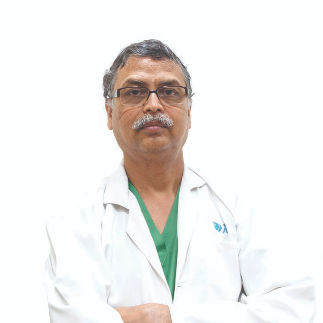Understanding Giant Cell Tumors (GCT) in Medicine
Gain a comprehensive understanding of Giant Cell Tumors (GCT) in medicine. Learn about their characteristics, common locations, diagnosis, and various treatment options for this unique bone tumor.

Written by Dr. J T Hema Pratima
Reviewed by Dr. Rohinipriyanka Pondugula MBBS
Last updated on 7th Aug, 2025

Giant Cell Tumors (GCT) are rare bone tumors that can affect anyone, though they are most commonly seen in young adults. While the word "tumor" can sound scary, it’s important to understand that not all tumors are cancerous. GCTs are usually benign (noncancerous), but they can still cause pain and other complications if left untreated. This article will help you understand what GCTs are, their symptoms, causes, and treatment options in simple, easy to understand terms.
What is a Giant Cell Tumor (GCT)?
A Giant Cell Tumor is a type of bone tumor that typically occurs near the ends of long bones, such as the thigh bone (femur), shin bone (tibia), or arm bone (humerus). These tumors get their name from the large "giant cells" seen under a microscope.
While GCTs are mostly benign, they can grow aggressively, weaken the bone, and sometimes recur after treatment. In rare cases, they may spread to other parts of the body (metastasize), but this is uncommon.
Who is at Risk?
GCTs are most commonly found in people between the ages of 20 and 40, and they affect women slightly more often than men. While the exact cause is unknown, some factors that may contribute include:
Bone overgrowth or injury – Some studies suggest that previous bone trauma may play a role.
Genetic factors – Certain genetic mutations may increase the risk.
Hormonal influences – Since GCTs are more common in young adults, hormones might be a factor.
Common Symptoms
The symptoms of a GCT depend on its size and location. Some people may not notice anything at first, while others experience:
Pain – Often the first sign, usually worsening at night or with activity.
Swelling or a lump – A noticeable bump near a joint.
Limited movement – If the tumor is near a joint, it may restrict movement.
Bone weakening – The tumor can make the bone fragile, increasing the risk of fractures.
If you have persistent bone pain or swelling, especially near a joint, it’s important to see a doctor for evaluation.
Consult Top Oncologist For personalised Tips
How is GCT Diagnosed?
If your doctor suspects a GCT, they may recommend:
1. X rays – The first step to see bone abnormalities.
2. MRI or CT scan – Provides detailed images of the tumor and surrounding tissues.
3. Biopsy – A small tissue sample is taken to confirm the diagnosis.
Early diagnosis helps in better management and prevents complications like bone fractures.
Treatment Options
Treatment depends on the tumor’s size, location, and whether it has spread. Common approaches include:
1. Surgery
Curettage – The tumor is scraped out, and the cavity is filled with bone graft or cement.
Wide excision – If the tumor is aggressive, part of the bone may need removal and reconstruction.
2. Medications (Denosumab)
A drug that helps shrink the tumor before surgery or manage recurring cases.
3. Radiation Therapy
Used when surgery isn’t possible, but rarely due to the risk of cancer transformation.
4. Physical Therapy
Helps restore movement and strength after treatment.
Living with GCT: Tips for Recovery
If you’ve been diagnosed with a GCT, here are some ways to support your recovery:
Followup visits – Regular checkups help detect recurrence early.
Healthy diet – Calcium and vitamin D rich foods (milk, leafy greens, fish) support bone healing.
Gentle exercise – Low impact activities like walking or swimming help maintain mobility.
Avoid strain – Protect the affected bone from heavy lifting or high-impact sports.
When to Seek Help?
If you experience:
Persistent bone pain
Sudden swelling or difficulty moving a joint
Unexplained fractures
Consult a doctor immediately. Early intervention can prevent complications.
Need Expert Advice?
If you suspect a bone tumor or need a second opinion, Apollo24|7 offers expert consultations and diagnostic services. You can book an appointment online and get personalized care from top specialists.
Final Thoughts
While Giant Cell Tumors can be concerning, most cases are treatable with timely medical care. Understanding the symptoms and seeking early diagnosis can make a big difference in recovery. Stay informed, follow medical advice, and take steps to keep your bones healthy.
If you have any concerns, don’t hesitate to reach out to a healthcare professional. Your health matters!
Consult Top Oncologist
Consult Top Oncologist For personalised Tips

Dr. Amit Choraria
Surgical Oncologist
18 Years • MBBS, MS (Surgery) Fellow, Surgical Oncology, Tata Medical Center (FSO) Fellow, European Board of Surgery (Surgical Oncology) (FEBS) Fellow, Minimal Access Surgery (FMAS) Fellow, Indian Association of Gastrointestinal Endosurgeons (FIAGES) UICC Fellow, Royal Marsden NHS, London, UK Visiting Scholar, Plastic Reconstructive Surgery, CGMH, Taiwan Fellow, Robotic Surgical Oncology, Vattikuti Foundation, USA
Kolkata
Apollo Multispeciality Hospitals , Kolkata, Kolkata

Dr. Rupam Manna
Radiation Specialist Oncologist
4 Years • MBBS MD(RADIO THERAPY)
Barasat
Diab-Eat-Ease, Barasat

Dr. Harsh J Shah
Surgical Oncologist
15 Years • MS, MCh (GI), DrNB (GI)
Ahmedabad
Apollo Hospitals Gandhinagar, Ahmedabad

Dr. V R N Vijay Kumar
Surgical Oncologist
9 Years • MBBS, MS (Gen. Surg.), DNB (Surg. Onco.)
Ahmedabad
Apollo Hospitals Gandhinagar, Ahmedabad

Dr. Praveen Kumar Garg
Surgical Oncologist
26 Years • MBBS, M.S.(Gen.Surg.), M.Ch.(OncoSurg.)
Delhi
Apollo Hospitals Indraprastha, Delhi
(50+ Patients)
Consult Top Oncologist

Dr. Amit Choraria
Surgical Oncologist
18 Years • MBBS, MS (Surgery) Fellow, Surgical Oncology, Tata Medical Center (FSO) Fellow, European Board of Surgery (Surgical Oncology) (FEBS) Fellow, Minimal Access Surgery (FMAS) Fellow, Indian Association of Gastrointestinal Endosurgeons (FIAGES) UICC Fellow, Royal Marsden NHS, London, UK Visiting Scholar, Plastic Reconstructive Surgery, CGMH, Taiwan Fellow, Robotic Surgical Oncology, Vattikuti Foundation, USA
Kolkata
Apollo Multispeciality Hospitals , Kolkata, Kolkata

Dr. Rupam Manna
Radiation Specialist Oncologist
4 Years • MBBS MD(RADIO THERAPY)
Barasat
Diab-Eat-Ease, Barasat

Dr. Harsh J Shah
Surgical Oncologist
15 Years • MS, MCh (GI), DrNB (GI)
Ahmedabad
Apollo Hospitals Gandhinagar, Ahmedabad

Dr. V R N Vijay Kumar
Surgical Oncologist
9 Years • MBBS, MS (Gen. Surg.), DNB (Surg. Onco.)
Ahmedabad
Apollo Hospitals Gandhinagar, Ahmedabad

Dr. Praveen Kumar Garg
Surgical Oncologist
26 Years • MBBS, M.S.(Gen.Surg.), M.Ch.(OncoSurg.)
Delhi
Apollo Hospitals Indraprastha, Delhi
(50+ Patients)

.webp)
